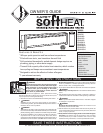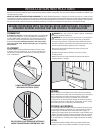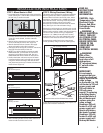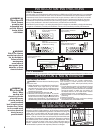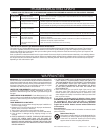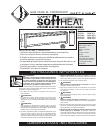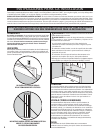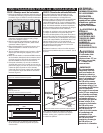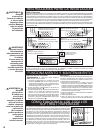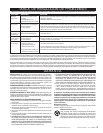
INSTALLATION INSTRUCTIONS
Inside a Softheat baseboard a hermetically sealed heat transfer fluid is
heated by an electric heating element. As the solution is heated, warmth
is generated and transmitted through dozens of aluminum fins along the
heater tube (it could initially take 30 to 60 minutes to warm a room,
depending on the room size). As the warmth spreads outward from the
heater, cooler air from the floor and wall naturally flow toward the base
of the heater. “Convection air heating” (see Figure 12) means no noisy fans
are needed and the room is warmed with even, comfortable heat. There
will be no cold and hot spots in the room as found with other types of
heaters. Softheat won’t blow or burn dust particles, making it allergist
recommended for patients with respiratory ailments or allergies.
WARNING!
Risk of Electrical
Shock. Connect
grounding lead
to grounding wire
provided. Keep all
foreign objects
out of heater.
WARNING!
Risk of Fire. Heaters
must be kept clean of
lint, dirt and debris.
Failure to follow
warnings may
cause heater to
eject sparks, ignite
materials, or cause
electrical shock.
WARNING!
Risk of Electrical
Shock. When
working with
electricity, turn the
electrical power
off at the electrical
panel board and
lock or tag the circuit
breaker door. Failure
to do so could result
in serious electrical
shock, burns, or
possible death!
OPERATION
&
MAINTENANCE
Maintenance
Softheat baseboards are virtually maintenance-
free. However, a certain amount of lint and dust
will accumulate inside, which periodically should
be removed.
1. Turn the electrical power off at the electrical panel
board (circuit breaker or fuse box). Lock or tag the
panel board door to prevent someone from accidentally
turning the power on while you are working on
the heater. Failure to do so could result in serious
electrical shock, burns, or possible death.
2. Allow the heater to cool to room temperature before
continuing.
3. Remove front panel.
4. Vacuum inside the unit, being careful not to damage
the aluminum fins on the heater tube.
How To Operate Your Heater
WARNING The heater must be installed properly
before it is used.
1. Switch the power on at the electrical panel board.
PLEASE NOTE: Upon initial start-up, the heater
may emit a burning odor. This is not dangerous and
is due to a protective lubricant used during the
manufacturing process.
2. Turn the thermostat fully clockwise.
3. When the room reaches your comfort level, turn the
thermostat knob counterclockwise until a clicking
sound is heard (if using a digital thermostat, set at
desired room temperature). The baseboard will
automatically cycle around this preset temperature.
Figure
12
HOW
SOFTHEAT
HYDRONIC
BASEBOARDS
WORK
STEP 3: Thermostat
For best results, use a Cadet electronic wall thermostat or an EBKN end cap DPST thermostat kit. It is recommended
that a thermostat be provided for each room. The location of the thermostat should be selected carefully.
Thermostats should not be located near drafts from an open doorway or within 18” (45.7cm) of an outside
wall, or in direct sunlight or unusual heat sources. A television set or appliance that builds up heat near
a thermostat will prevent the thermostat from functioning properly. A wiring diagram illustrating typical
wiring of the thermostat is included in the literature provided with the thermostat.
Illustrated in Figures 7 through 11 are wiring diagrams typical of a single unit controlled by a single pole thermostat,
a single unit controlled by a double pole thermostat, and two units controlled by a double pole thermostat.
STEP 4: Reassemble
Tuck wires into wiring compartment cover, and replace one screw previously removed. Replace front heater cover.
4
Figure 7
Single Pole Wall Thermostat
Left End Wiring
Figure 8
Single Pole Wall Thermostat
Right End Wiring
Figure 9
Double Pole Wall Thermostat
or EBKN Left End Wiring
Figure 10
Double Pole Wall Thermostat
or EBKN Right End Wiring
Figure 11
Connecting Multiple Units
Left End Wiring



